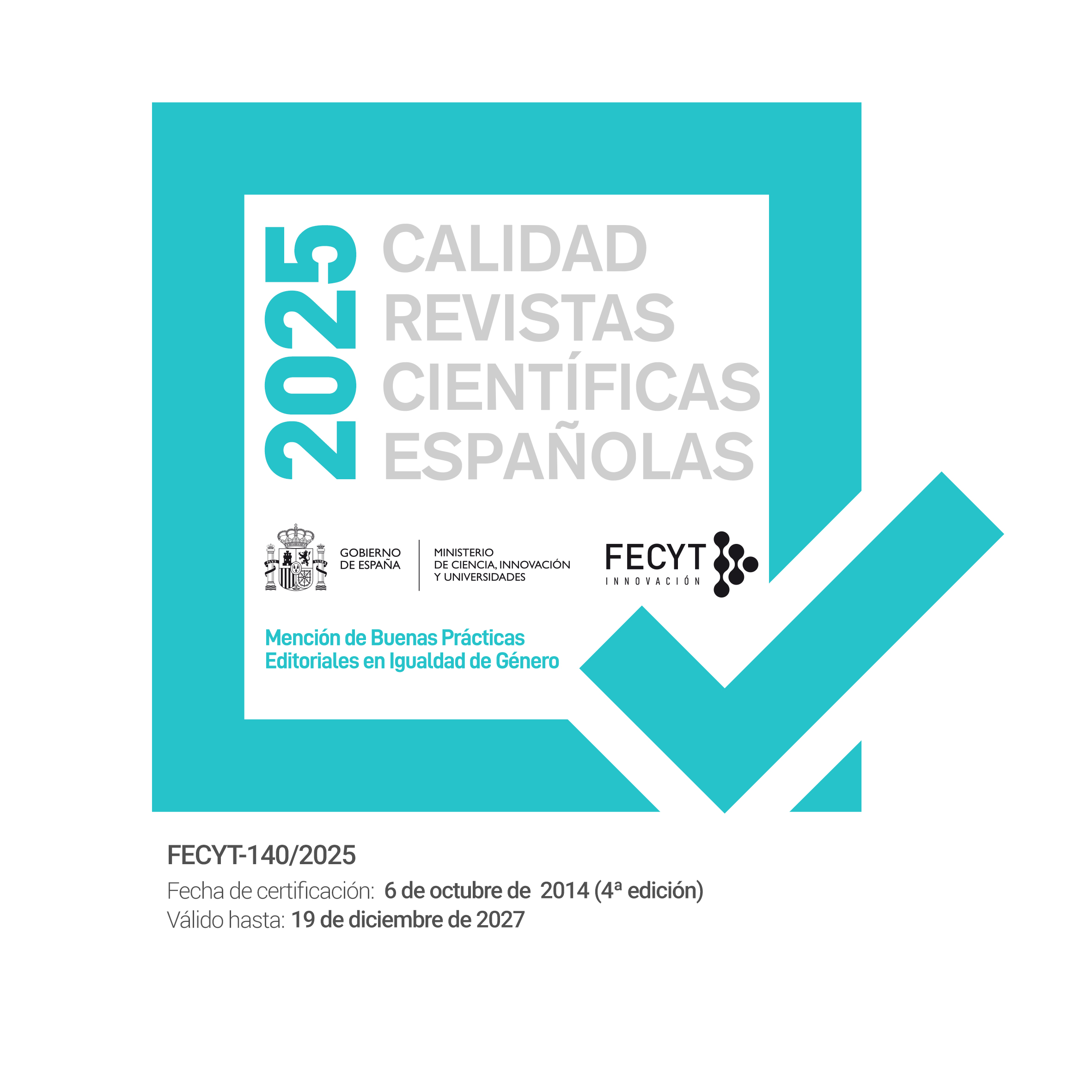Distribución sociométrica en Educación Infantil: razones de aceptación y rechazo a los iguales
DOI:
https://doi.org/10.5944/educxx1.36780Palabras clave:
aceptación entre iguales, rechazo entre iguales, relaciones entre iguales, métodos sociométricos, estatus sociométrico, género, necesidades educativas específicas, educación infantilResumen
El rechazo entre iguales es un fenómeno muy estudiando en educación secundaria y primaria, dadas las consecuencias negativas presentes y futuras que tiene en el estudiante. Sin embargo, no ha sido tan estudiando en edades tempranas, siendo la educación infantil una etapa de gran importancia, ya que es cuando se empiezan a forjar las relaciones sociales, y su influencia es decisiva en el desarrollo socioemocional posterior. Este estudio tiene por objetivo conocer la distribución sociométrica en el segundo ciclo de educación infantil, teniendo en cuenta el género, el curso y si los estudiantes tienen, o no, necesidades educativas específicas de apoyo educativo. Además, se profundiza en los motivos que los estudiantes argumentan para aceptar o rechazar a sus iguales. Han participado 2116 niños y niñas de 105 aulas de los tres cursos del segundo ciclo de educación infantil. Mediante un procedimiento sociométrico, se obtiene que un 11.5% son rechazados, 8.3% preferidos, 6.7% ignorados, 2.5% controvertidos, y 71% medios. El porcentaje de niños rechazados es similar en los tres cursos, y significativamente superior al de las niñas, al igual que aquellos que presentan necesidades educativas. Han informado de 11989 motivos, 7876 de aceptación, y 4113 de rechazo, agrupados en 34 categorías. Las principales razones de aceptación son el tener afinidad, disfrutar de juegos compartidos y las características de personalidad, mientras que la de rechazo hace referencia a la agresividad física, junto a las conductas inmaduras, o molestas con los demás. Las niñas argumentan más razones de reciprocidad afectiva, mientras que los niños son menos expresivos o no son conscientes de las causas. Se discuten implicaciones educativas a tener en cuenta en las aulas para mejorar la aceptación, integración y clima de aula.
Descargas
Citas
Bengtsson, H., Arvidsson, A., & Nyström, B. (2022). Negative emotionality and peer status: evidence for bidirectional longitudinal influences during the elementary school years. School Psychology International, 43(1), 88-105. https://doi.org/10.1177%2F01430343211063546
Bierman, K. L., Kalvin, C. B., & Heinrichs, B. S. (2014). Early childhood precursors and adolescent sequelae of grade school peer rejection and victimization. Journal of Clinical Child & Adolescent Psychology, 44, 367–379. https://doi.org/10.1080/15374416.2013.873983
Carter, C. (2021). Navigating young children’s friendship selection: implications for practice. International Journal of Early Years Education, 31(2), 519-534. https://doi.org/10.1080/09669760.2021.1892600
Chávez, D. V., Salmivalli, C., Garandeau, C. F., Berger, C., & Kanacri, B. P. L. (2022). Bidirectional associations of prosocial behavior with peer acceptance and rejection in adolescence. Journal of Youth and Adolescence, 51(12), 2355-2367. https://doi.org/10.1007/s10964-022-01675-5
Chen, J., Justice, L. M., Rhoad-Drogalis, A., Lin, T.J., & Sawyer, B. (2020). Social networks of children with developmental language disorder in inclusive preschool programs. Child Development, 91(2), 471-487. https://doi.org/10.1111/cdev.13183
Chow, J. C., Broda, M. D., Granger, K. L., Washington-Nortey, M., & Danielle Dunn, R. S. (2023). A sociometric approach to understanding characteristics of same— and other-gender friendships in young children. Early Childhood Research Quarterly, 62, 385-393. https://doi.org/10.1016/j.ecresq.2022.09.009
Chow, J. C., Granger, K. L., Broda, M. D., & Washington-Nortey, P. M. (2022). Influence of child externalizing behavior on friendship centrality and reciprocity in kindergarten classrooms. Journal of Emotional and Behavioral Disorders, 31(4). https://doi.org/10.1177/10634266221110861
Cillessen, A. H. N., & Marks, P. E. L. (2017). Methodological choices in peer nomination research. New Directions for Child and Adolescent Development, 157, 21–44. https://doi.org/10.1002/cad.20206
Coie, J. D., Dodge, K. A., & Coppotelli, H. (1982). Dimensions and types of social status: a cross-age perspective. Developmental Psychology, 18(4), 557–570. https://doi.org/10.1037/0012-1649.18.4.557
Consejo Escolar del Estado (2022). Informe 2022 sobre el estado del sistema educativo. Ministerio de Educación y Formación Profesional. https://bit.ly/46PwBit
Cuenca-Sánchez, V., & Mendoza-González, B. (2017). Comportamiento prosocial y agresivo en niños: tratamiento conductual dirigido a padres y profesores. Acta de Investigación Psicológica, 7(2), 2691-2703.
Estrada-Fernández, C., Ros-Morente, A., & Alsinet-Mora, C. (2023). Influence of anger management and emotional skills on self-esteem in pre-adolescents and their relationship with emotional control and psychological well-being. Revista de Psicología y Educación, 18(1), 62-70. https://doi.org/10.23923/rpye2023.01.235
Fabes, R. A., Martin, C. L., & Hanish, L. D. (2018). Children and youth in a diverse world: applied developmental perspectives on diversity and inclusion. Journal of Applied Developmental Psychology, 59, 1–4. https://doi.org/10.1016/j.appdev.2018.11.003
Ferreira, M., Aguiar, C., Correia, N., Fialho, M., & Pimentel, J. S. (2019). Friendships and social acceptance of Portuguese children with disabilities: the role of classroom quality, individual skills, and dosage. Topics in Early Childhood Special Education 39(3), 183-195. https://doi.org/10.1177/0271121419864419
García-Bacete, F. J., Sureda, I., & Monjas, M. I. (2008). Distribución sociométrica en las aulas de chicos y chicas a lo largo de la escolaridad. Revista de Psicología Social, 23(1), 63-74. https://doi.org/10.1174/021347408783399480
González, J., & García-Bacete, F. J. (2010). Sociomet. Programa para la Realización de Estudios Sociométricos. TEA Ediciones.
Greco, C. (2019). ¿Cómo es un mejor amigo o mejor amiga? Características de los vínculos de amistad en niños y niñas de Argentina. Actualidades en Psicología, 33(126), 69-82.
Hacıibrahimoğlu, B. Y. (2022). Preschool children’s behavioural intentions towards and perceptions of peers with disabilities in a preschool classroom. Early Child Development and Care, 192(16), 2513-2529. https://doi.org/10.1080/03004430.2021.2023516
Hanish, L. D., Martin, C. L., Cook, R., DeLay, D., Lecheile, B., Fabes, R. A., Goble, P., & Bryce, C. (2021). Building integrated peer relationships in preschool classrooms: the potential of buddies. Journal of Applied Developmental Psychology, 73, 101257. https://doi.org/10.1016/J.APPDEV.2021.101257
Hladik, J., & Hrbackova, K. (2021). Peer-rejected students: an analysis of their self-regulatory mechanisms. Children and Youth Services Review, 126, Artículo 106030. https://doi.org/10.1016/j.childyouth.2021.106030
Khalfaoui, A., García-Carrión, R., & Villardón-Gallego, L. (2021). A systematic review of the literature on aspects affecting positive classroom climate in multicultural early childhood education. Early Childhood Education Journal, 49(1), 71-81. https://doi.org/10.1007/s10643-020-01054-4
Kiuru, N., Poikkeus, A. M. Lerkkanen, M. K., Pakarinen, E., Siekkinen, M., Ahonen, T., & Nurmi, J. E. (2012). Teacher-perceived supportive classroom climate protects against detrimental impact of reading disability risk on peer rejection. Learning and Instruction, 22(5), 331-339. https://doi.org/10.1016/j.learninstruc.2011.12.003
Lloyd-Esenkaya, V., Russell, A. J., & Clair, M. C. (2020). What are the peer interaction strengths and difficulties in children with developmental language disorder? A systematic review. International Journal of Environmental Research and Public Health, 17(9), 3140. https://doi.org/10.3390%2Fijerph17093140
Luis-Rico, M. I., De la Torre-Cruz, T., Escolar-Llamazares, M. C., Ruiz-Palomo, E., Huelmo-García, J., Palmero-Cámara, C., & Jiménez-Eguizábal, A. (2020). Influencia del género en la aceptación o rechazo entre iguales en el recreo. Revista de Educación, 387, 89-111. https://doi.org/10.4438/1988-592X-RE-2020-387-440
LoParo, D., Fonseca, A. C., Matos, A. P., & Craighead, W. E. (2023). A developmental cascade analysis of peer rejection, depression, anxiety, and externalizing problems from childhood through young adulthood. Research on Child and Adolescent Psychopathology, 51, 1303-1314. https://doi.org/10.1007/s10802-023-01053-0
Martín-Antón, L. J., Monjas, M. I., García-Bacete, F. J., & Jiménez-Lagares, I. (2016). Problematic social situations for peer-rejected students in the first year of elementary school. Frontiers in Psychology, 7, 1925. https://doi.org/10.3389/fpsyg.2016.01925
Molinero-González, P., Martín-Antón, L. J., Carbonero-Martín, M. Á., & Arteaga-Cedeño, W. L. (2023). Estrategias docentes para reducir el rechazo entre iguales en infantil: aplicación piloto. Revista Fuentes, 25(1), 26-36. https://doi.org/10.12795/revistafuentes.2023.21526
Monjas, M. I., Martín-Antón, L. J., García-Bacete, F. J., & Sanchiz, M. L. (2014). Rechazo y victimización al alumnado con necesidad de apoyo educativo en primero de primaria. Anales de Psicología, 30(2), 499-511. https://doi.org/10.6018/analesps.30.2.158211
Monjas, M. I., Sureda, I., & García-Bacete, F. J. (2008). ¿Por qué los niños y las niñas se aceptan y se rechazan? Cultura y Educación, 20(4), 479-492. https://doi.org/10.1174/113564008786542181
Nergaard, K. (2020). «The heartbreak of social rejection»: young children’s expressions about how they experience rejection from peers in ECEC. Child Care in Practice, 26(3), 226-242. https://doi.org/10.1080/13575279.2018.1543650
Parlatan, M. E., & Sığırtmaç, A. D. (2022). Preschool children’s behaviours in competitive games: are these games really harmful to social-emotional development? Early Child Development and Care, 192(14), 2200-2212. https://doi.org/10.1080/03004430.2021.1990910
Peceguina, M. I. D., Daniel, J. R., Correia, N., & Aguiar, C. (2022). Teacher attunement to preschool children’s peer preferences: associations with child and classroom-level variables. Early Childhood Research Quarterly, 60, 150-160. https://doi.org/10.1016/j.ecresq.2022.01.004
Prino, L. E., Longobardi, C., Fabris, M. A., & Settanni, M. (2022). Attachment behaviors toward teachers and social preference in preschool children. Early Education and Development, 34(4), 1-17. https://doi.org/10.1080/10409289.2022.2085980
Rodríguez-Medina, J., Martín-Antón, L. J., Carbonero, M. A., & Ovejero, A. (2016). Peer-mediated intervention for the development of social interaction skills in high-functioning autism spectrum disorder: a pilot study. Frontiers in Psychology, 7, 1986. https://doi.org/10.3389/fpsyg.2016.01986
Schoop-Kasteler, N., & Müller, C.M. (2021). Brief research report: agreement between teacher and student reports on students’ acceptance and rejection. Frontiers in Education, 6, 726854. https://doi.org/10.3389/feduc.2021.726854
Sette, S., Baldwin, D., Zava, F., Baumgartner, E., & Coplan, R.J. (2019). Shame on me? Shyness, social experiences at preschool, and young children’s self-conscious emotions. Early Childhood Research Quarterly, 47, 229-238. https://doi.org/10.1016/j.ecresq.2018.12.012
Shin, Y. L. (2019). Friendship characteristics of rejected children in middle childhood. Family and Environment Research, 57(3), 307-314. https://doi.org/10.6115/fer.2019.022
Sjöblom, M., Jacobsson, L., Öhrling, K., & Kostenius, C. (2020). Schoolchildren’s play – a tool for health education. Health Education Journal, 79(1), 21-33. https://doi.org/10.1177/0017896919862299
Suárez-García, Z., Álvarez-García, D., & Rodríguez, C. (2018). Alumnado rechazado por sus compañeros en Educación Infantil: prevalencia, diferencias de género y relación con problemas externalizados. Revista de Estudios e Investigación en Psicología y Educación, 5(2), 125-132. https://doi.org/10.17979/reipe.2018.5.2.4421
Van der Wilt, F., Van der Veen, C., Van Kruistum, C., & Van Oers, B. (2018). Why can’t I join? Peer rejection in early childhood education and the role of oral communicative competence. Contemporary Educational Psychology, 54, 247-254. https://doi.org/10.1016/j.cedpsych.2018.06.007
Wang, Y., Palonen, T., Hurme, T. R., & Kinos, J. (2019). Do you want to play with me today? Friendship stability among preschool children. European Early Childhood Education Research Journal, 27(2), 170-184. https://doi.org/10.1080/1350293X.2019.1579545
Whal, S., Trauntschnig, T., Hoffmann, L., & Schwab, S. (2022). Peer acceptance and peer status in relation to students’ special educational needs, migration biography, gender and socio-economic status. Journal of Research in Special Educational Needs, 22(3), 243-254. https://doi.org/10.1111/1471-3802.12562
Xiao, S. X., Hanish, L. D., Malouf, L. M., Martin, C. L., Lecheile, B., Goble, P., Fabes, R. A., DeLay, D., & Bryce, C. I. (2022). Preschoolers’ interactions with other-gender peers promote prosocial behavior and reduce aggression: an examination of the Buddy Up intervention. Early Childhood Research Quarterly, 60, 403-413. https://doi.org/10.1016/j.ecresq.2022.04.004
Yue, X., & Zhang, Q. (2023). The association between peer rejection and aggression types: a meta-analysis. Child Abuse & Neglect, 135, 105974. https://doi.org/10.1016/j.chiabu.2022.105974
Zarra-Nezhad, M., Moazami-Goodarzi, A., Aunola, K., Nurmi, J. E., Kiuru, N., & Lerkkanen, M. K. (2019). Supportive parenting buffers the effects of low peer acceptance on children’s internalizing problem behaviors. Child Youth Care Forum, 48, 865-887. https://doi.org/10.1007/s10566-019-09510-y

Descargas
Publicado
Versiones
- 2024-01-24 (4)
- 2024-01-24 (3)
- 2024-01-24 (2)
- 2024-01-02 (1)
Cómo citar
Número
Sección
Licencia
Derechos de autor 2023 Luis J. Martín-Antón, Paula Molinero-González, Miguel A. Carbonero, Wendy L. Arteaga-Cedeño

Esta obra está bajo una licencia internacional Creative Commons Atribución-NoComercial 4.0.
La revista Educación XX1 se publica bajo licencia Creative Commons Reconocimiento-NoComerciaL 4.0 (CC BY-NC 4.0). Se permite la generación de obras derivadas siempre que no se haga un uso comercial. Tampoco se puede utilizar la obra original con finalidades comerciales.










